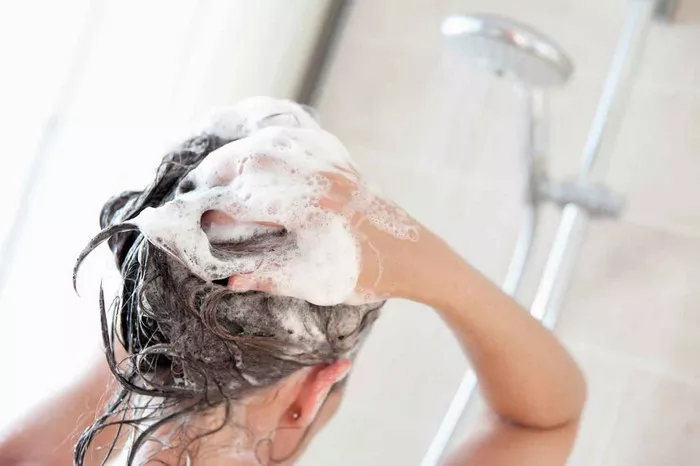In the quest for sleek, manageable locks, there’s nothing more frustrating than stepping out of the shower, only to find your hair looking like a wild tangle of frizz. If this scenario sounds all too familiar, fear not, for you’re not alone. Many individuals experience the same hair dilemma. In this comprehensive guide, we will delve deep into the reasons behind frizzy hair after a shower and provide you with expert tips to regain control over your mane.
The Culprits Behind Post-Shower Hair Frizz
Frizz, that pesky hair predicament, often arises from a precarious moisture balance. Hair’s porosity level, be it low, medium, or high, dictates its water-absorption behavior. High-porosity hair, swiftly sopping up water but struggling to retain it, is more susceptible to frizz. The insidious influence of humidity exacerbates the matter, causing hair shafts to swell, leading to an unruly frizzy appearance. Further aggravating the situation, certain shampoos laden with sulfates can strip away hair’s natural oils, leaving it parched and prone to frizz. Understanding these culprits is the first step in winning the battle against post-shower hair frizz.
Crafting Your Anti-Frizz Shower Routine
Now that we’ve identified the root causes, it’s time to take action and transform your post-shower hair frizz into a thing of the past. Follow these essential steps:
1. Choose the Right Shampoo and Conditioner:
Opt for sulfate-free products designed to hydrate and nourish your hair. Look for ingredients like argan oil, shea butter, or coconut oil, which can help combat frizz.
2. Cool Down the Water Temperature:
Hot water can strip your hair of its natural oils, leaving it susceptible to frizz. Use lukewarm water instead to maintain your hair’s moisture balance.
3. Use a Wide-Toothed Comb:
Gently detangle your hair with a wide-toothed comb while it’s still wet. This minimizes breakage and helps distribute conditioner evenly.
4. Blot, Don’t Rub:
After showering, avoid vigorously rubbing your hair with a towel. Instead, gently blot it to remove excess water. Excessive friction can rough up the hair cuticle, leading to frizz.
5. Apply a Leave-In Conditioner:
A leave-in conditioner can provide an extra layer of protection against frizz. It helps lock in moisture and smoothen the hair shaft.
Styling Strategies for Frizz-Free Hair
Maintaining frizz-free hair goes beyond your shower routine. Proper styling techniques can make a significant difference:
1. Avoid Heat Styling:
Excessive heat can dehydrate your hair and make it more prone to frizz. If you must use heat tools, apply a heat protectant spray first and use them on a lower setting.
2. Silk Pillowcases:
Sleeping on a silk pillowcase can help reduce friction between your hair and the pillow, preventing overnight frizz.
3. Regular Trims:
Schedule regular trims to get rid of split ends and maintain the health of your hair. Healthy hair is less prone to frizz.
4. Serum or Oil Finishing:
Apply a frizz-control serum or hair oil to your hair’s ends to add shine and tame any unruly strands.
Environmental Factors and Frizz Control
Environmental conditions can also impact your hair’s frizz levels:
1. Weather-Appropriate Hairstyles:
In high-humidity conditions, consider styling your hair in updos or braids to keep it under control.
2. Hats and Scarves:
On particularly humid or windy days, protect your hair by wearing a hat or scarf.
3. Anti-Humidity Products:
Look for hair products specifically designed to combat humidity and frizz. These often contain ingredients like glycerin to repel moisture.
The Role of Diet and Hydration
Your diet and overall health also play a crucial role in managing frizzy hair:
1. Stay Hydrated:
Drink plenty of water to keep your body and hair hydrated from the inside out.
2. Eat Nutrient-Rich Foods:
Consume foods rich in omega-3 fatty acids, vitamins, and minerals to promote hair health. Salmon, avocados, and nuts are excellent choices.
3. Supplements:
Consult with a healthcare professional about incorporating supplements like biotin or collagen into your diet for stronger, healthier hair.
See Also: The Benefits of Scalp Massager: Nurturing Your Hair and Scalp
In conclusion
Achieving frizz-free hair after a shower is entirely possible with the right approach. By understanding the causes of post-shower hair frizz and implementing the recommended tips and techniques, you can enjoy smoother, more manageable locks, regardless of the weather or your hair type. Embrace these changes, and say goodbye to frizzy hair woes once and for all.


